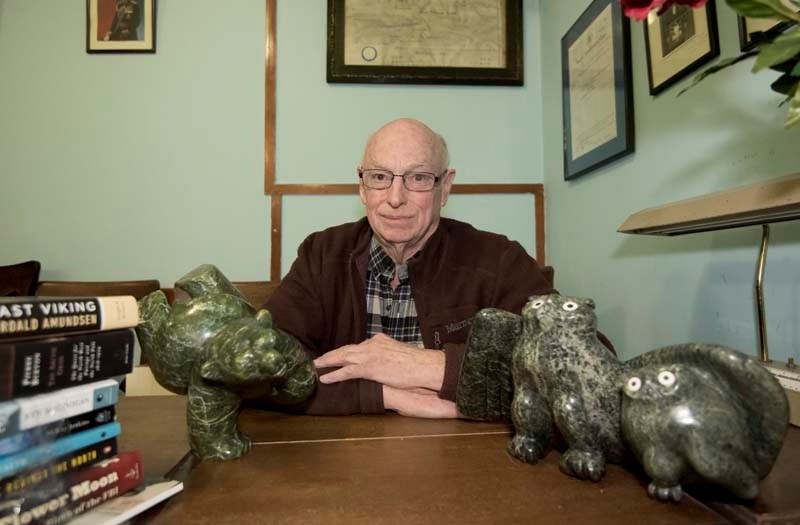On a typical wintry day in Nunavut back in 2012, Jim Emmett and his wife, Josephine Wilson, flew into the Coral Harbour Airport.
On a typical wintry day in Nunavut back in 2012, Jim Emmett and his wife, Josephine Wilson, flew into the Coral Harbour Airport. They were packed into a turboprop plane with a week's worth of provisions for the community, including medical supplies and food.
It was a snowstorm and Emmett had a hunch it would be a patch landing, where the captain would work with the ground crew to find a safe patch of ground in or near the airport for the plane to land.
It wasn't the first time the couple experienced a turbulent arrival and they were growing accustomed to the quirks. In fall 2007, when the couple first arrived in Nunavut to begin their locum family practice, they were dropped onto a zodiac in the sea near Iqaluit and then transported to a rocky beach.
“Rocks which were greater in diameter than the wheels of the two large suitcases we pulled across the beach, ” Emmett said, garnering laughter from the audience of about 50 people at the Cochrane IDEAS meeting March 9.
His presentation highlighted his adventures of practising medicine in the north but he said the experience contributed to his understanding of indigenous culture, and by extension how to better treat patients on a human level.
“As you leave here tonight, I hope you have a better understanding of Nunavut as its land and Nunavut as its people in particular. ”
When he arrived at the hospital they would be stationed at, Emmett noted it had an arborite surface with metal rim, a design dating back to the 1960s and one of his first indications of the need for medical support in the region.
“We arrived in our sort of naive state, ” Emmett said.
He added the experience helped to shape and reaffirm he and his wife's established practices.
Much of his time was spent in the Nunavut capital of Iqaluit, at the Qikiqtani General Hospital, though he was also posted all over Baffin Island, the northern shores of Hudson's Bay, and communities along the Arctic Ocean.
Emmett had medical training from the University of British Columbia, and McMaster University, during the 1960s. After private practice in Vancouver, and also working with the indigenous communities in Haida Gwaii, he relocated to Morley where he worked as the medical director of the Stoney Health Centre for four years. He then practised family medicine in Calgary for several decades and has lived in Canmore for the past nine years.
Wilson graduated from the University of Alberta medical school and Emmett during her internship at Vancouver General Hospital.
Wilson was a candidate for physician of the year for family practice and president of the Medical Staff Organization at Foothills Hospital and the Regional Medical Staff Association and was the first woman to be allowed to carry her maiden name as her professional name.
Their first experience working together was at the Stoney Health Centre on the Stoney First Nations reserve where Emmett was medical director and Wilson the family medicine resident.
“The adventure in life is shared, and it was a shared experience for sure, ” Emmett said.
He addressed some of the unique challenges of medicine in the north during his presentation, explaining that out of the roughly 20 determinants of health, there are only about three that can be controlled.
“A vast amount of how the thing that determines how a person becomes a patient and experiences illness is influenced by the environment, social factors, by crowding, by congestion and infection, ” he said, adding those factors are particularly problematic in northern communities. “In other words, it's a reinforcement of what most people know but can't control.
“Us physicians have to realize, continually that is the case and I think that was reinforced in my own experience while working in the north. ”
He said it added to the idea that patients are people.
“I think people will often, in a very genuine way if you allow them, will accurately express their problem, ” Emmett said, adding he aimed to reinforce the notion of allowing people to fully express themselves in his practice.
“That often gives a huge amount of information of your patient. ”
Emmett added that working together with staff has been critical to provide the best service to patients.
“Just a profound importance of working together with each other, whether it's a medevac person, whether it's nurses - who I have huge respect for. It's not anyone being a hero. It's everyone working together. It's a very enjoyable thing to experience, ” he said.
Heike Kvetschmev, an audience member at the meeting, said she specifically appreciated Emmett's knowledge and respect for First Nations and Inuit culture.
“He was lucky that he had that already and could bring his knowledge and wisdom up there. When he talked about how he interacted with the families, it was so evident that he knew that, ” Kvetschmev said
